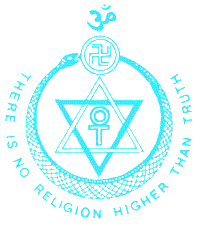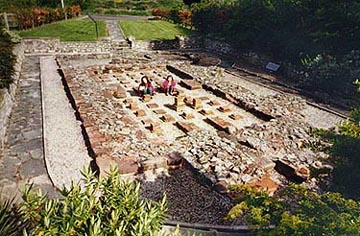KARMA

A Study in Karma
by
Annie Besant
Published in 1917

The
Laws of Nature
Our next step in our study is a consideration of the
"Laws of Nature". The whole universe is included within the ideas of
succession and causation, but when we come to what we call the laws of nature,
we are unable to say over what area
they extend. Scientists find themselves compelled to
speak with greater and greater caution as they travel beyond the limit of
actual observation. Causes and effects which are continuous within the area of
our observation may not exist in other regions, or workings which are here
observed as invariable may be
interrupted by the irruption of some cause outside the
"known" of our time, though probably not outside the knowable.
Between 1850 and 1890 there were many positive statements as to the
conservation of energy and the indestructibility of matter. It was said that
there existed in the universe a certain amount of
energy, incapable of diminution or of increase; that
all forces were forms of that energy, that the amount of any given force, as
heat, might vary, but not the total amount of energy. As 20 may be made up of
20 units, or of 10 twos, or of 5 fours, or of 12+8, ) and so on, but the total
remains as 20, so with the varying forms and the total amount. With regard to
matter, again, similar
statements were made; it was indestructible, and hence
remained ever the same in amount; some, like Ludwig Buchner, declared that the
chemical elements were indestructible, that "an atom of carbon was ever an
atom of carbon," and so on.
On these two ideas science was built up, and they
formed the basis of materialism. But now it is realised that chemical elements
are dissoluble, and that the atom itself may be a swirl in the ether, or
perhaps a mere hole where ether is not. There may be atoms through which force
pours in, others through
which it pours out – whence? – whither ? May not
physical matter become intangible, resolve itself into ether? May not ether
give birth to new matter?
All is doubtful where once certainty reigned. Yet has
a universe its "Ring-Pass-Not". Within a given area only can we speak
with certainty of a "law of nature".
What is a law of nature? Mr. J.N. Farquhar, in the
Contemporary Review for July, 1910, in an article on Hinduism, declares that if
Hindus want to carry out reforms, they must abandon the idea of karma. As well
might he say that if a man
wants to fly he must abandon the idea of an
atmosphere. To understand the law of karma is not to renounce activity, but to
know the conditions under which activity is best carried on. Mr. Farquhar, who
has evidently studied modern Hinduism
carefully, has not grasped the idea of karma as taught
in ancient
scripture and in modern science.
A law of nature is not a command, but a statement of
conditions. This cannot be repeated too often, nor insisted on too strongly.
Nature does not order this thing or the other; she says: "Here are certain
conditions; where these exist, such and such a result will invariably
follow." A law of nature is an invariable
sequence. If you do not like the result, change the
preceding conditions.
Ignorant, you are helpless, at the mercy of nature’s
hurtling forces; wise, you are master, and her forces serve you obediently.
Every law of nature is an enabling, not a compelling, force, but knowledge is
necessary for utilising her powers.
Water boils at 100 degrees C. under normal pressure.
This is the condition. You go up a mountain; pressure diminishes; water boils
at 95 degrees. Now water at 95 degrees will not make good tea. Does Nature then
forbid you to have good tea on a mountain-top? Not at all: under normal
pressure water boils at the necessary temperature for tea-making; you have lost
pressure; supply the deficit; imprison your escaping steam till it adds the
necessary pressure, and you can make your tea with water at 100 degrees. If you
want to produce water by the union of hydrogen and oxygen, you require a
certain temperature, and can obtain it from the electric spark. If you insist
on keeping the temperature at zero, or in substituting nitrogen for hydrogen,
you cannot have water. Nature lays down the conditions which result in the
production of water, and you cannot change them; she neither supplies nor
withholds water; you are free to have it
or to go without it; if you want it, you must bring
together the necessary things and thus make the conditions. Without these, no
water. With these, inevitably water. Are you bound or free? Free as to making
the conditions; bound as to the result, when once you have made them. Knowing
this, the scientific man, face to face with a difficulty, does not sit down
helplessly; he finds out
the conditions under which he can bring about a
result, learns how to make the conditions, sure that he can rely on the result.
______________________
KARMA

Find out more about
Theosophy with these links

The Cardiff Theosophical Society Website
The
National Wales Theosophy Website
If you run a Theosophy Group, please feel free
to use any of the material on this site
The Most Basic Theosophy
Website in the Universe
A quick overview of Theosophy
and the Theosophical Society
If you run a Theosophy Group you
can use this as an introductory handout.
Theosophy Cardiff’s Instant Guide
One liners and quick explanations
H P Blavatsky is
usually the only
Theosophist that
most people have ever
heard of. Let’s
put that right
The Voice of the Silence Website
An Independent Theosophical Republic
Links to Free Online Theosophy
Study Resources; Courses, Writings,
The main criteria
for the inclusion of
links on this
site is that they have some
relationship
(however tenuous) to Theosophy
and are
lightweight, amusing or entertaining.
Topics include
Quantum Theory and Socks,
Dick Dastardly and Legendary Blues Singers.
A selection of
articles on Reincarnation
Provided in
response to the large
number of enquiries
we receive at
Cardiff
Theosophical Society on this subject
The Voice of the Silence Website
On the North Wales
coast 22 miles from
the main Roman
Legionary Fort at Chester, England
The baths are
believed to be part of a harbour complex
for shipping lead
from local mines
This is for
everyone, you don’t have to live
in Wales to make
good use of this Website
No Aardvarks were harmed in the
The Spiritual Home of Urban Theosophy
The Earth Base for Evolutionary Theosophy
A B C D EFG H IJ KL M N OP QR S T UV WXYZ
Complete Theosophical Glossary in Plain Text Format
1.22MB
________________
Preface
Theosophy and the Masters General Principles
The Earth Chain Body and Astral Body Kama – Desire
Manas Of Reincarnation Reincarnation Continued
Karma Kama Loka
Devachan
Cycles
Arguments Supporting Reincarnation
Differentiation Of Species Missing Links
Psychic Laws, Forces, and Phenomena
Psychic Phenomena and Spiritualism
Quick Explanations with Links
to More Detailed Info
What is Theosophy ? Theosophy Defined (More Detail)
Three Fundamental Propositions Key Concepts of Theosophy
Cosmogenesis
Anthropogenesis
Root Races
Karma
Ascended Masters After Death States Reincarnation
The Seven Principles of Man Helena Petrovna Blavatsky
Colonel Henry Steel Olcott William Quan Judge
The Start of the Theosophical Society
History of the Theosophical Society
Theosophical Society Presidents
History of the Theosophical Society in Wales
The Three Objectives of the Theosophical Society
Explanation of the Theosophical Society Emblem
Glossaries of Theosophical Terms
An Outstanding
Introduction to Theosophy
By a student of
Katherine Tingley
Elementary Theosophy Who is the Man? Body and Soul
Body, Soul and Spirit Reincarnation Karma
Try these if you are looking for a local
Theosophy Group or Centre
UK Listing of Theosophical Groups

